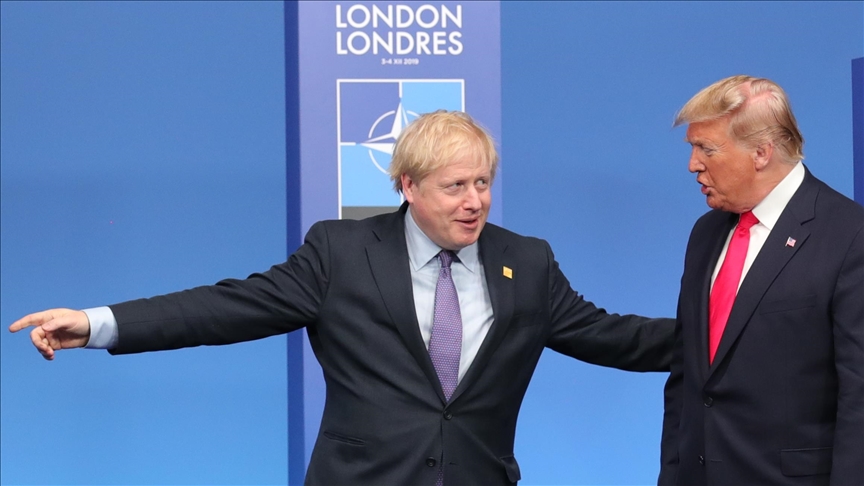Former British premier Johnson urges Europe to back Trump on ending Ukraine war
'When are we Europeans going to stop being scandalized about Donald Trump and start helping him to end this war?' asks Boris Johnson
 US President Donald Trump (R) British Prime Minister Boris Johnson (C) during the NATO Summit in London, United Kingdom in December, 2019. ( Mustafa Kamacı - Anadolu Agency )
US President Donald Trump (R) British Prime Minister Boris Johnson (C) during the NATO Summit in London, United Kingdom in December, 2019. ( Mustafa Kamacı - Anadolu Agency )
LONDON
Former UK Prime Minister Boris Johnson on Wednesday called on European nations to stop being “scandalized” by US President Donald Trump and instead help him bring about an end to the war in Ukraine.
On X, Johnson criticized European hesitancy to support key measures to aid Ukraine and said that Trump's remarks – though often provocative – were designed to spur action.
“When are we Europeans going to stop being scandalized about Donald Trump and start helping him to end this war?” Johnson said, pushing for greater European involvement in efforts to force Russia to pay for the damage caused by its “violent invasion.”
He dismissed recent claims that Ukrainian President Volodymyr Zelenskyy’s job approval rating had plummeted, saying: “Of course Zelenskyy’s ratings are not 4%. They are actually about the same as Trump’s.”
Johnson also rejected criticism of Ukraine’s decision not to hold elections during the war, comparing the situation to Britain’s decision to suspend general elections during World War II. “There was no general election in the UK from 1935 to 1945,” he pointed out.
Johnson urges Europe to unfreeze Russian assets
A key focus of Johnson’s remarks was the $300 billion in frozen Russian assets, mostly held in European banks, which he argued should be used to support Ukraine and compensate the US for its military aid.
“The US can see $300bn of frozen Russian assets – mainly in Belgium. That is cash that could and should be used to pay Ukraine and compensate the US for its support,” he said.
According to Johnson, the US is growing increasingly frustrated with European nations, particularly Belgium and France, for preventing the release of Russian funds. “The US believes Belgium, France and other countries are blocking (the funds). It’s absurd. We need to get serious and fast.”
US-European relations deteriorated last week after US President Donald Trump initiated direct discussions with Russian President Vladimir Putin about Ukraine peace talks without European involvement. At the weekend Munich Security Conference, Keith Kellogg, Trump's special envoy for Russia and Ukraine, confirmed that Europeans would not be invited to planned US-Russia talks on Ukraine peace.
Adding to the tension, US Defense Secretary Hegseth suggested that European countries, not the US, should provide peacekeeping troops to Ukraine. Hegseth specifically stated that any such deployment should be non-NATO and would not be covered under Article 5 (on NATO’s collective defense), stressing that US troops would not be part of any security guarantee arrangements.








